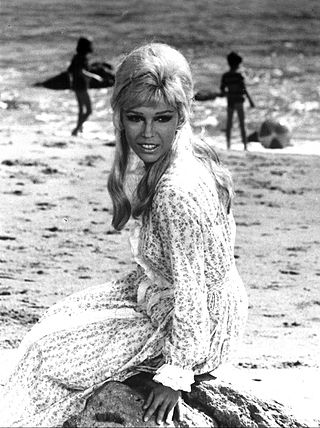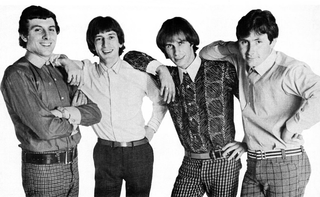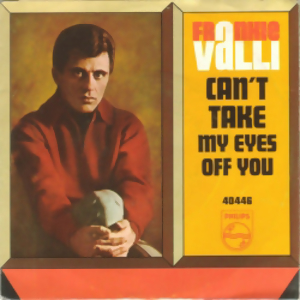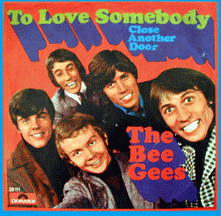
Nancy Sandra Sinatra is an American singer-songwriter, actress, film producer and author. She is the elder daughter of Frank Sinatra and Nancy Sinatra and is known for her 1965 signature hit "These Boots Are Made for Walkin'".

The Rolling Stones are an English rock band formed in London in 1962. Active across seven decades, they are one of the most popular and enduring bands of the rock era. In the early 1960s, the band pioneered the gritty, rhythmically driven sound that came to define hard rock. Their first stable line-up consisted of vocalist Mick Jagger, guitarist Keith Richards, multi-instrumentalist Brian Jones, bassist Bill Wyman, and drummer Charlie Watts. During their early years, Jones was the primary leader. Andrew Loog Oldham became their manager in 1963 and encouraged them to write their own songs. The Jagger–Richards partnership became the band's primary songwriting and creative force.

Maurice Ernest Gibb was a British musician and songwriter. He achieved worldwide fame as a member of the pop group Bee Gees. Although his elder brother Barry Gibb and twin brother Robin Gibb were the group's main lead singers, most of their albums included at least one or two songs featuring Maurice's lead vocals, including "Lay It on Me", "Country Woman" and "On Time". The Bee Gees are one of the most successful pop-rock groups of all time.

Lesley Sue Goldstein, better known with her maternal surname as Lesley Gore, was an American singer and songwriter. At the age of 16, she recorded her first hit song "It's My Party", a US number one in 1963. She followed it up with ten further US Billboard top 40 hits including "Judy's Turn to Cry" and "You Don't Own Me". Gore said she considered "You Don't Own Me" her signature song.

The Troggs are an English beat music band formed in Andover, Hampshire in May 1964. Their most famous songs include the US chart-topper "Wild Thing", "With a Girl Like You" and "Love Is All Around", all of which sold over 1 million copies and were awarded gold discs. "Wild Thing" is ranked No. 257 on the Rolling Stone magazine's list of The 500 Greatest Songs of All Time and was an influence on garage rock and punk rock.

Are You Experienced is the debut studio album by the Jimi Hendrix Experience, released in May 1967. The album was an immediate critical and commercial success, and is widely regarded as one of the greatest albums of all time. It features Jimi Hendrix's innovative approach to songwriting and electric guitar playing, which soon established a new direction in psychedelic and rock music as a whole.

"Light My Fire" is a song by the American rock band the Doors. Although it was principally written by the band's guitarist, Robby Krieger, songwriting was credited to the entire band. Recognized as one of the earliest examples of psychedelic rock, it was recorded in August 1966 and released in January 1967 on their eponymous debut album. Due to its erotic lyrics and innovative structure, the track has come to be regarded as synonymous with the '60s psychedelic and sexual revolutions.

"A Whiter Shade of Pale" is a song by the English rock band Procol Harum that was issued as their debut record on 12 May 1967. The single reached number 1 in the UK Singles Chart on 8 June and stayed there for six weeks. Without much promotion, it reached number 5 on the US Billboard Hot 100. One of the anthems of the 1967 Summer of Love, it is one of the most commercially successful singles in history, having sold more than 10 million copies worldwide. In the years since, "A Whiter Shade of Pale" has become an enduring classic, with more than 1,000 known cover versions by other artists.

Keith Lionel Urban is an Australian and American country singer, songwriter, and guitarist. Recognised with four Grammy Awards, he also received 15 Academy of Country Music Awards, including the Jim Reeves International Award, 13 CMA Awards, and six ARIA Music Awards. Urban wrote and performed the song "For You" from the film Act of Valor, which earned him nominations at both the 70th Golden Globe Awards and at the 18th Critics' Choice Awards in the respective Best Original Song categories.

"Foxy Lady" is a song by The Jimi Hendrix Experience. It first appeared on their 1967 debut album Are You Experienced and was later issued as their third single in the U.S. with the alternate spelling. It is one of Hendrix's best-known songs and was frequently performed in concerts throughout his career. Rolling Stone magazine placed the song at number 153 on its list of the "500 Greatest Songs of All Time".

"Somethin' Stupid", or "Something Stupid", is a song written by C. Carson Parks. It was originally recorded in 1966 by Parks and his wife Gaile Foote, as Carson and Gaile. A 1967 version by Frank Sinatra and his daughter Nancy Sinatra became a major international hit, reaching number one on both the Billboard Hot 100 chart and the UK Singles Chart. In 2001, a cover version by British vocalist Robbie Williams and Australian actress Nicole Kidman reached number one in the UK Singles Chart.

"Can't Take My Eyes Off You" is a 1967 song written by Bob Crewe and Bob Gaudio, and first recorded and released as a single by Gaudio's Four Seasons bandmate Frankie Valli. The song was among his biggest hits, earning a gold record and reaching No. 2 on the Billboard Hot 100 for a week, making it Valli's biggest solo hit until he hit No. 1 in 1975 with "My Eyes Adored You".

"To Sir with Love" is the theme from James Clavell's 1967 film To Sir, with Love. The song was performed by British singer and actress Lulu, and written by Don Black and Mark London. Mickie Most produced the record, with Mike Leander arranging and conducting. The song peaked at the top of the Billboard Hot 100, and became the best-selling single of 1967 in the United States.

"Tell It Like It Is" is a song written by George Davis and Lee Diamond and originally recorded and released in 1966 by Aaron Neville. In 2010, the song was ranked No. 391 on Rolling Stone magazine's list of The 500 Greatest Songs of All Time.

"To Love Somebody" is a song written by Barry and Robin Gibb. Produced by Robert Stigwood, it was the second single released by the Bee Gees from their international debut album, Bee Gees 1st, in 1967. The single reached No. 17 in the United States and No. 41 in the United Kingdom. The song's B-side was "Close Another Door". The single was reissued in 1980 on RSO Records with "How Can You Mend a Broken Heart" as its flipside. The song ranked at number 94 on NME magazine's "100 Best Tracks of the Sixties". The entry was a minor hit in France but reached the top 10 in Canada.

"You Better Sit Down Kids" is a major hit single by American singer/actress Cher in 1967 from her fourth studio album With Love, Chér, released in November 1967 by Imperial Records. The song was written by her then-husband Sonny Bono. Sung from a father's perspective, the lyrics tell the story of a divorce as explained to the couple's children. The song is featured on the compilation albums Cher's Golden Greats (1968), Superpack Vol. 1 (1972) and Gold (2005).

"Then You Can Tell Me Goodbye" is a song written by John D. Loudermilk. It was first released in 1962 by Don Cherry, as a country song and again as a doo-wop in 1967 by the group The Casinos on its album of the same name, and was a number 6 pop hit that year. The song has since been covered by Eddy Arnold, whose version was a number 1 country hit in 1968, and by Neal McCoy, whose version became a Top 5 country hit in 1996.

T. Rex were an English rock band formed in London in 1967 by singer-songwriter and guitarist Marc Bolan, who was their leader, frontman and only consistent member. Though initially associated with the psychedelic folk genre, Bolan began to change the band's style towards electric rock in 1969, and shortened their name to T. Rex the following year. This development culminated in 1970 with their first significant hit single "Ride a White Swan", and the group soon became pioneers of the glam rock movement.

"Here We Go Again" is a country music standard written by Don Lanier and Red Steagall that first became notable as a rhythm and blues single by Ray Charles from his 1967 album Ray Charles Invites You to Listen. It was produced by Joe Adams for ABC Records/Tangerine Records. To date, this version of the song has been the biggest commercial success, spending twelve consecutive weeks on the US Billboard Hot 100 chart, peaking at number 15.


















